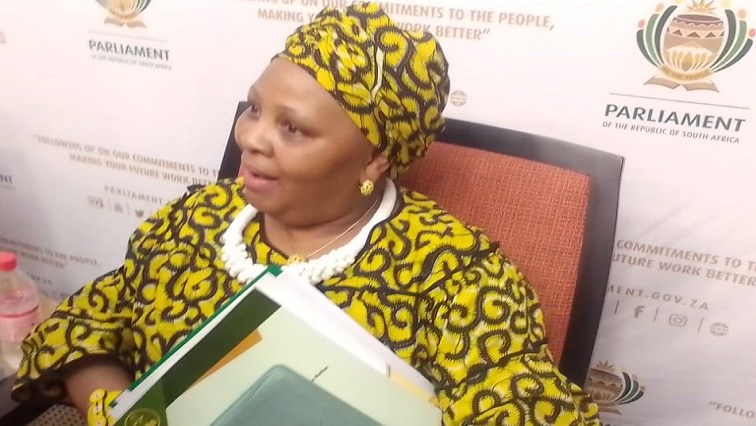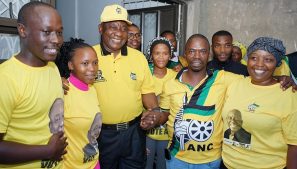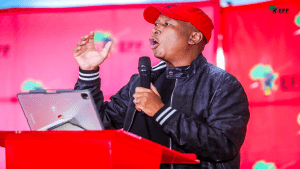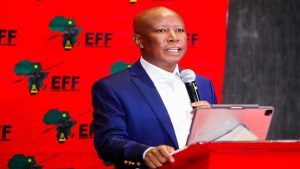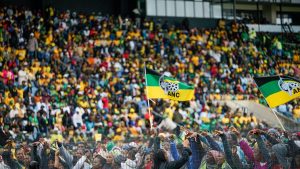The alleged concealment of a burglary and theft of large sums of US dollars from President Cyril Ramaphosa’s farm in Phala Phala, Limpopo, nearly three years ago, became prominent six months ago when the President appeared in Parliament.
Former State Security Director-General Arthur Fraser brought the alleged crime to light, filing criminal charges and alleging that Ramaphosa concealed the theft.
Presidency budget vote
Since the Phala Phala saga came under the spotlight in June this year, interruptions led by the Economic Freedom Fighters (EFF) became one of the orders of the day when Ramaphosa appeared before the National Assembly. It started during the Presidency’s Budget Vote Debate and the reply to the debate the following day. EFF Members of Parliament were forcefully removed from the chamber for preventing Ramaphosa from speaking. Some of the EFF Members who were in the House were dragged out of the chamber after refusing to leave the House when they were ordered to do so.
Cellphone video footage captured by Mercedes Besent on 10th June 2022:
After their removal, one of the party’s MP Sinawo Thambo vowed that the President would never speak in the House, even in future.
“They have prejudiced agenda to victimize EFF members and that’s what they are doing and we are saying it’s not going to work. Because he is used to torturing domestic workers there in Phala Phala farm, he is used to killing Marikana workers in North West. Because he spilled blood there, we are not going to be scared of him. It’s not going to happen. We are going to keep coming back. Ramaphosa is not going to address any sitting as the President. We have raised it sharply that he is a money launderer, he is a kidnapper and an abductor, a human trafficker and the briber who has broken his oath of office and has no right to address us,” Thambo reacted after he was dragged out of the chamber.”
House sitting adjourned
National Assembly Speaker Nosiviwe Mapisa-Nqakula was forced to adjourn the House sitting abruptly for chief whips of various political parties to consult on the way forward.
ANC Chief Whip Pemmy Majodina responded about the removal of the EFF MPs and interruption of the President’s reply to his budget vote. Majodina told SABC Radio News in an interview after the removal of EFF MPs that according to the rules when there is a grave disorder in the House the Presiding Officer must suspend a session.
“So the session is suspended for a few minutes now because the violence has just started in the House and it is uncalled for. Today there is one item on the agenda. The President must respond and that’s what’s on the agenda. People cannot bring the (Phala Phala) matter that is not even started in terms of investigations, (the) President has not been charged. President is not going to a trial, so people must just come down and allow the processes to follow.”
ATM’s motion to remove the President over Phala Phala
The Phala Phala scandal led to the African Transformation Movement (ATM) leader Vuyo Zungula unsuccessfully tabling a motion of no confidence in terms of Section 102 of the Constitution for the removal of the President from office.
Zungula submitted a new motion which was ultimately approved by Mapisa-Nqakula in August. This was after he had invoked Section 89 of the Constitution in line with National Assembly Rule 129 (A) for the motion to be considered and approved.
The entire National Assembly Rule 129 outlines all the processes to be followed whenever a member tables a motion for the removal of a President in terms of Section 89 of the Constitution.
“We do welcome to what the Speaker has acceded to our request for the process to continue. We are of the view that Mr Ramaphosa has violated the constitution because the motion of No Confidence speaks to the performance of the President on a wide range of issues of unemployment, lack of economic growth, etc. However, Section 89 speaks to a situation where the President has violated the constitution which warrants that his conduct is examined by parliament in order for him to be impeached. We as the ATM have identified four charges based on Arthur Fraser, his affidavit that he has submitted to the police station or in public either via his tweets which are from his official accounts is the first charge which is a violation of 96 (b) of the Constitution,” Zungula emphasised as he welcomed the approval of his draft motion.
After the approval of the ATM motion, a group of various opposition parties including the ATM subsequently held a media briefing calling for an impeachment committee to be established. They also met to discuss various strategies on how to approach the Phala Phala matter.
Joint media briefing by opposition parties:
However, Parliament’s Spokesperson Moloto Mothapo said the Speaker welcomed the commitment by the opposition to submit the names of persons to serve on an independent panel by 1 September 2022 after they were invited by the Speaker to submit their nominations. Mothapo, however, had cautioned that the call for an impeachment committee was premature,
“The function of the Independent Panel is essential to conduct a preliminary assessment of the (ATM) motion and evidence and make findings and recommendations to the National Assembly within 30 days whether sufficient evidence exists to show the President committed any of the violations specified in the motion. These then will be debated and considered by the National Assembly. It must therefore be stressed that a special Section 89 committee may only be established based on the findings and recommendations of the panel and following a decision of the House,” explained Mothapo in response to the calls made by the group of opposition parties.
Names of preferred nominees
After all political parties submitted the names of their preferred nominees, Mapisa-Nqakula appointed a three-member panel of experts in mid-September. The panel chaired by retired Chief Justice Sandile Ngcobo had thirty days to determine whether or not Ramaphosa had a case to answer on constitutional grounds.
It could not start its assessment as there were objections from the EFF and the Democratic Alliance (DA) to the inclusion of the Professor of Law at the University of Cape Town Richard Calland who was subsequently replaced by Senior Counsel Mahlape Sello.
“The panel has been fully appointed. Of course, there are issues are being dealt with of the service level agreements which are being attended to by the office of Mr Xaso. Obviously once that is finalised, am sure that should be finalised by Friday which is tomorrow and once that is finalise, it means that the panel may need to start its work,” Mapisa made the announcement at a National Assembly Programme Committee meeting towards the end of September.
The panel could only start its work on 19 October 2022. Members of the National Assembly who had wished to make submissions had six days to do so. They had to make submissions from 22 to 27 October. The ATM was one of the parties that met the deadline.
“I can confirm that the ATM has submitted its documents to the panel with all the evidence. I remember the ATM is the main complainant in the matter. So, it was important for us to submit it on time. The evidence we submitted we believe it would assist the panel of three to come to the vibrant and positive conclusion that we are all expecting. Yes, I cannot go into the content of the document. It’s now in the hands of the panel. It’s now going to be interrogated by the panel,” said ATM Spokesperson Sibusiso Mncwabe.
Some parties made no submissions
The leaders of two political parties, the Freedom Front Plus (FF-Plus) and Al Jama ah had indicated their parties would not participate in providing information to the panel. FF-Plus Leader Pieter Groenewald told SABC News in Parliament that it was a futile exercise if the panel were not to ask the police to submit information during the preliminary assessment.
“The Panel investigating the Phala Phala issue as far as President Ramaphosa is concerned is now requesting political parties to submit any information they have. The Freedom Front Plus does not have any information besides what has appeared in newspapers, but what is important is that the panel must ensure that the police can supply and submit certain documentation and at least that some of the police officers appear in front of the panel to be questioned. Only then will we know what the truth is behind this whole Phala Phala exercise and if they do not call the police before the panel, then this exercise is absolutely futile,” Groenewald explained.
‘Wasteful expenditure’
Al Jama Ah leader Ganief Hendricks described the preliminary assessment by the panel as a wasteful expenditure and said the Phala Phala matter was already under investigation by various law enforcement agencies. Hendricks said the party believed that it was sufficient to allow the law to take its course.
“Al Jama Ah is not going to make a submission regarding the Phala Phala preliminary assessment. We feel that the current processes that have been launched are sufficient. However, it is a decision by Parliament and we respect that decision, although for Al Jama Ah that is actually wasteful expenditure.”
Ramaphosa received submissions from EFF, UDM and ATM
The EFF, ATM and the United Democratic Movement (UDM) were the only three parties that made submissions. After Ramaphosa received the submissions of the three parties from the panel, he was given 10 days from 28 October to 6 November to respond to the submitted information. The President met the 10-day deadline of submitting his responses to the panel on the 6th of November.
“President Ramaphosa has always made certain that throughout his tenure as President, to abide by his oath of office and set an example in his respect for the Constitution, its institutions, due process and the rule of law. President Ramaphosa categorically denies that he violated this oath in any way, and denies that he is guilty of any of the allegations made against him,” Presidential Spokesperson Vincent Magwenya said on Monday 7th of November.
Panel’s 30-day deadline
After the panel received all the submissions and the President’s responses, it had to consider all the information from 7 to 17 November. The information was assessed to determine whether Ramaphosa had a case to answer on constitutional grounds or not. During the assessment, the panel had to conduct any additional research required, further deliberate on the facts, and write and finalise its report before submitting it to Mapisa-Nqakula. However, the panel could not conclude its work within the thirty-day period which had to end on the 17th of November. It was granted a thirteen-day extension by the Speaker after consultation with the multi-party Chief Whips Forum.
Speaker sent Panel’s letter to party Chief Whips
The report was finalised and officially handed over to Mapisa-Nqakula by Justice Ngcobo during a media briefing on the 30th of November. Ngcobo thanked the ATM, EFF, UDM and President Ramaphosa for the submissions they made to the panel to conduct the assessment:
“In particular I would like to thank them for submitting the information to us in time despite the extremely tight schedule within which they had to produce this material. And ironically it is precisely this information that made it impossible for us to meet the required deadline.”
The report was made public in the daily parliamentary publication, the ATC (Announcements, Tablings and Committee reports), hours later. The panel found that the information that was placed before it disclosed that the President may have committed a serious violation of Section 96 (2 ) (a) of the constitution. The section states that members of Cabinet and deputy ministers may not undertake any other paid work. They also found that the President may have seriously violated the constitution in terms of Section 96 (2) (b) by acting in a way that is inconsistent with his oath of office and exposing himself to any situation involving the risk of a conflict between his official responsibilities and private interests of the constitution.
VOLUME 1 OF THE PANEL’S REPORT
Debate on the report postponed by a week
The findings in the panel’s report meant paving way for the President to possibly face a Section 89 inquiry if the Assembly approved the report. The report was initially scheduled to be debated on 6 December, but the National Assembly Programme Committee held a special meeting where it approved an ANC proposal for the debate to be re-scheduled from the 6th to the 13th of December. One of the reasons was to allow all members of the Assembly to be physically present during the sitting at the Cape Town City Hall which could accommodate 400 members. MPs were allowed to individually vote openly on the report after the debate. The crux of the debate was whether the Assembly would endorse or reject the panel’s report and whether it would resolve to establish a committee for the president to face a Section 89 inquiry.
December 13 Debate
The report was brought before the House on Tuesday13th December at the City Hall which is one of the venues used by Parliament to host National Assembly sittings. The ATM, EFF and some opposition parties unsuccessfully made a call for the use of a secret ballot during the voting procedure. The Speaker rejected their last-minute attempts to call for a secret ballot. Their call was prompted by allegations that Pan Africanist Congress (PAC) Leader and MP Mzwanele Nyontsho had received a threatening text message from an unknown number, a day before the debate. The message allegedly warned him and UDM leader Bantu Holomisa against voting in favour of the report.
Here is a video of parties arguing in favour of an open versus secret ballot.
All political parties including the ANC participated in the debate. There were mixed views from across political parties.
Voting on the report followed with National Assembly Members either voting Yes, No, or Abstaining. The method of voting was a roll-call which requires that the names of MPs be called to vote publicly in the chamber. Five ANC MPs defied the party line. They voted in favour of the report and for the President to face a Section 89 Inquiry.
Minister of Co-operative Governance and Traditional Affairs Dr Nkosazana Dlamini Zuma led the protest vote. Four other ANC MPs who also voted in favour of the report were Thandi Mahambehlala who unsuccessfully wanted to change her vote later, Supra Mahumapelo, Mervin Dirks and Mosebenzi Zwane.
MPs Vote “YES, No, or Abstaining”
The Assembly resolved not to pass the report or to establish a committee to conduct the Section 89 Inquiry after the majority voted against the panel’s report. Mapisa-Nqakula read the results:
“Those who voted yes 148, those who voted no, 214, abstain…2. therefore the section 89 inquiry will therefore not be proceeded. That concludes the business of the day and the House is adjourned,” concluded Mapisa Nqakula.
Link to video of Speaker Mapisa-Nqakula announcing the results.
Hive of activity before and after sitting
Some of the ANC MPs who voted against the report celebrated in song after the sitting. However, there were also activities that took place ahead of the debate apart from the preparations before the debate. Various roads around the City Hall were cordoned off on the day. Hours before the special sitting, there was a protest outside Parliament with an organisation called Stop Farm Killings led by Perus Phakamile Sitho who called on President Ramaphosa to resign.
Sitho and a handful of protesters held placards outside the main entrance of Parliament before moving to continue with the protest in the vicinity of the City Hall. Another protest was held a few kilometres away from the City Hall by the Western Cape ANC Women’s League in support of Ramaphosa.
Gallery of some of the pictures captured by Mercedes Besent on 13th December:
Court action over Section 89 Report and voting method
Meanwhile, there are various threats of court action over the report and the voting method that was used. The ATM has filed an urgent court application to challenge the open voting system that was used during the sitting and Mapisa-Nqakula’s refusal to accede to the request of some opposition parties to allow the use of a secret ballot.
On the other side, President Ramaphosa has taken the Section 89 panel’s report on judicial review.


